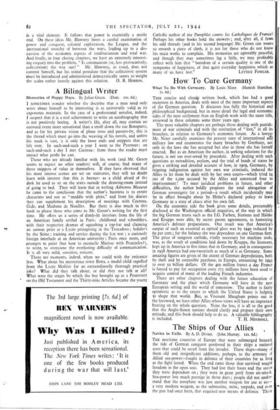A Bilingual Writer
Memories of Happy Days. By Julian Green. (Dent. - ros. 6d.)
I SOMETIMES wonder whether the doctrine that a man need only write about himself to be interesting is as universally valid as its exponents maintain. In the case of a professional novelist, indeed, I suspect that it is a real achievement to write an autobiography that is not positively boring. A writer's life, after all, may contain no outward event more sensational than a stroll down the rue Bonaparte, and as for his private vision of plane trees and passers-by, this is the thread which must go into the weaving of his novels, and unless his stock is vast, it is only the loose ends and snippets that are left over. In such-and-such a year I went to the Pyrenees: on such-and-such a day I met Cocteau: from these the reader must extract what profit he can.
Those who are already familiar with his work (and Mr. Green seems to expect no other readers) will, of course, find many of these snippets of value in themselves. If they have observed that his most intense scenes are set on staircases, they will no doubt learn with interest that this is because as a child afraid of the dark he used to sit on the stairs outside the drawing-room instead of going to bed. They will learn that in writing Adrienne Mesurat he came to the conclusion that the author's business is to create characters and not to " meddle with plots," and from his diaries they can supplement his description of meetings with Cocteau, Gide, and Madame de Noailles. But there is also much in this book to please those who come to Mr. Green's writing for the first time. He offers us a series of dimly-lit interiors from the life of an American family settled in Paris: childhood and schooldays, with their respective dramas of squashing a top-hat and claiming an unwon prize at a Lycee prizegiving in the Trocadero ; holidays by the Seine ; training and service during the last war ; a curiously foreign interlude at an American university ; Paris once more, and attempts to paint (but how to reconcile Matisse with Praxiteles?), to write, to overcome the everlasting difficulty of communication. It is all very mild, sensitive, reticent.
There are moments, indeed, when we could wish the reticence less. What about his mysterious sister Retta, a model child expelled from the Lycee Moliere for an extraordinarily thorough practical joke? What did they talk about, or did they not talk at all? What were the stages by which the boy brought up as a Protestant on the Old Testament and the Thirty-nine Articles became the young.
Catholic author of the Pamphlet contre les Catholiques de Franeet Perhaps his other books hold the answers.; and, after all, if from his odd threads (and in his second language) Mr. Green can weave so smooth a piece of cloth, it is not for those who do not know his main works to complain. His memories are agreeably peaceful, and though they may sometimes lag a little, we may profitably reflect with him that " boredom of a certain quality is one of the symptoms of happiness, of that quiet everyday happiness which so






















 Previous page
Previous page